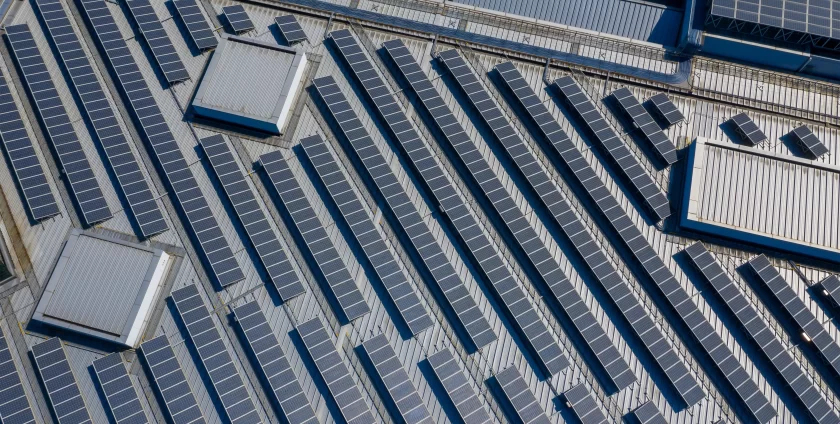
Introduction to Industrial Solar Installations
The industrial sector is a significant contributor to energy consumption of a greenhouse gas emissions in India and accounting for over 41% of the country’s energy consumption.
As solar energy is becoming more and more popular sustainable, environmentally friendly practices, renewable energy sources, particularly solar power have become an attractive option for factories.
Solar power not only helps industries reduce their energy expenses but also contributes to a greener business reputation and a reduced carbon footprint.
In this blog post, we will discuss the benefits of solar power for factories, warehouses as well as the types of solar power plant installation available for industrial applications.
Benefits of solar power for factories and warehouses include:
Cost savings from reduced electricity bills
Solar panels can significantly reduce electricity costs for factories and warehouses by generаting their electricity and reducing reliance on grid power and a taken advantage of net metering to offset future energy bills.
Green business reputation and consumer appeal
By utilizing solar power, factories and warehouses can enhance their brand image as environmentally conscious businesses. This is a great way of attracting environmentally conscious customers and elevating your public image.
Government incentives and support for renewable energy adoption
In some countries, governments offer tax credits and subsidies to encourage the adoption of solar energy. For instance; 30% installation cost subsidy in India and the benchmark feed in tariff in China.
Energy independence
Solar power provides factories and warehouses with a degree of energy independence and reducing reliance on the grid on protecting against power outages or other disruptions.
Environmental benefits
Solar energy is a clean and renewable source of energy. One of the major ways to reduce carbon emissions and fossil fuel consumption to a more sustainable future.
Roof protection
Solar panels can protect roofs from direct sunlight, reduce the temperature inside the building and act as a shade tree оver the roof.
Types of Solar Installations for Industrial Applications:
The choice of industrial solar panel installation depends on various factors including the available space and energy and the budget of the industrial facility. It is essential to consult with a solar energy expert to determine the most suitable option for a specific industrial application.
Rooftop solar installations
Rooftop solar installations are the most common type of solar installations for factories and warehouses. They involve mounting solar panels on the roofs of industrial buildings which can save space and reduce costs compared to ground mounted installations.
Ground mounted solar installations
Ground mounted solar installations are suitable for industrial buildings with large open spaces. They involve setting up solar panels on the ground usually in a field or parking lot and can provide a larger capacity compared to rooftop installations.
Solar carports and canopies
Solar carports and canopies are another type of solar installation that can be used in industrial applications. They involve installing solar panels on top of parking structures and providing shade for vehicles while generating electricity.
Hybrid solar systems with energy storage
Hybrid solar systems combine solar panels with energy storage solutions such as batteries. These systems can store excess solar energy during the day and release it during peak demand or at night providing a more consistent energy supply.
Tax Incentives for Installing Solar Panels
In India and there are several tax incentives for installing solar panels. These incentives include:
Income Tax exemption
Project developers are exempt from paying income tax on all project earnings for the first ten years of their existence.
Accelerated Depreciation
Companies can claim 40% of the total upfront cost as depreciation in the first year if they opt for solar which decreases the tax payment in the earlier years.
Sales Tax, Excise Tax, and Customs Duty Exemptions
The government provides exemptions from sales tax and excise taxes and customs duties on renewable components and equipment as well as energy efficient appliances.
Capital Subsidies
The government encourages capital subsidies to boost residential rooftop installations in both rural and urban areas . The SRISTI plan is known to function with solar panel installation in urban areas to provide electricity to all homes.
Assured Power Purchase Agreement (PPA)
State utilities guarantee the purchase of solar power through a PPA that has a negative load and is used regularly. This allows investors to put their underused property to good use by constructing solar power plants.
Renewable energy Certificates (ReCs)
ReCs are tradable certificates that aim to reward those that generate green energy. The ReC is issued by the Central electricity Regulatory Commission and is required for solar rooftop panel installation.
Net Metering Incentives
With net metering and the electricity generated by the solar panels is used for self consumption and a the customer receives the DISCOMs’ electricity bill. The Banking Charges clause allows the consumer to be paid for net units kept in the grid infrastructure for eventual use.
Cost of Solar Power Plant
The cost of solar power plant installation in India can vary depending on the size of the system and the quality of the components.
It is important to note that the cost of electrical energy are subject to change based on factors such as government subsidies and installation charges inverter costs and mounting structure costs and battery costs.
Additionally investing in high-quality companies may increase the upfront cost but can result in better performance and longevity.
Encouragement for More Businesses to Adopt Solar energy Solutions
Encouraging more businesses to adopt solar energy solutions is crucial for sustainability and cost efficiency. By transitioning to solar power, industries can benefit from reduced energy bills enhanced brand image and environmental conservation and long term cost savings.
The shift towards renewable energy sources like solar power not only helps individual businesses but also contributes to a greener and more sustainable future for all.
Embracing solar energy is not only a smart financial decision but also a responsible choice that aligns with global efforts towards environmental preservation and energy efficiency.
- By: jjpvsolar
- 0 comment

